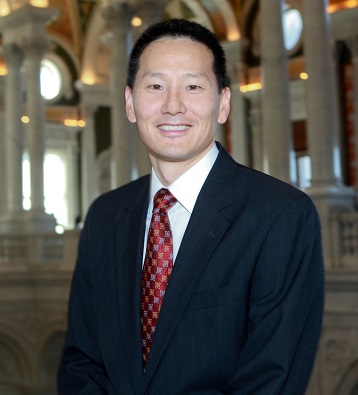by Melissa I. Cardenas-Dow
This feature essay on an Asian/Pacific American library leader focuses on David Mao, currently Deputy Librarian of Congress. When I initiated the e-mail conversation in late February 2015, I had just gotten the news that David had just been appointed Law Librarian of Congress. I sent some questions to David, focusing on his background and his thoughts on library leadership and diversity. This article provides an edited version of David’s responses.
Melissa Cardenas-Dow (MICD): Tell us a little bit about yourself, your career to date?
David Mao (DM): I was born in New York City, but raised in New Jersey. After graduating with a B.A. in international affairs from the George Washington University, I earned a J.D. from the Georgetown University Law Center. I then practiced law for several years before returning to graduate school to pursue a master’s degree in library science at the Catholic University of America. My first library position was at Georgetown, followed by several library positions at the international law firm Covington and Burling. From there I moved to the Congressional Research Service at the Library of Congress. In 2010 I transferred to the Law Library of Congress as Deputy Law Librarian. I was appointed Law Librarian of Congress in January 2012 and in January of this year, I was named Deputy Librarian of Congress.
MICD: What ways do you see yourself as a diverse professional?
DM: I interpret diverse professional to mean all the different facets that an individual brings to the workplace. For me, that includes being of Chinese descent and being born and raised in the United States. I also have gained tremendously from extended living, studying and traveling in Asia. Professionally, I have worked in academia, the private sector and public service. The sum of all these experiences has influenced my work ethic, approach to business and outlook on the future.
MICD: Please describe an instance in which diversity played a beneficial role in your library work.
DM: Over the years, I have interviewed numerous candidates for library positions. As noted above, I have worked professionally in various sectors (academic, private and public) and thus have been able to understand better how applicants’ experiences in those areas may relate to the particular position sought.
MICD: Has it been challenging to move up the leadership ladder? How did you make the move from middle to upper management?
DM: Moving up the leadership ladder has been challenging just like achieving any other goal that one sets out for oneself. It takes hard work, steady progress and commitment. Throughout my career I have looked for and taken advantage of opportunities both within and external to my work organizations. These opportunities included lending assistance on projects, making connections with others and seeking feedback.
MICD: How does diversity influence your leadership style?
DM: As a result of my various experiences, I welcome and seek different perspectives in how to approach challenges and opportunities.
MICD: What attributes do you look for in future leaders?
DM: The basic qualities I look for in a future leader are intelligence and good interpersonal skills. Talented individuals will have the ability to innovate using available resources and to find opportunities in times of change. Two skills I count as important in a future leader includes technical know-how and the knowledge of how to apply technology appropriately to areas throughout an organization.
MICD: Are these the same skills, talents and qualities you recommend diverse professionals develop as they seek new leadership positions? Please explain further.
DM: These are only a small sampling of the skills, talents and qualities that a professional should have! Of course, every leader has a unique set of aptitudes that he or she cultivates and applies to the organization. Part of professional development means acquiring those skills, knowledge and abilities that will make an individual the right “fit” for a particular position or organization.
MICD: What advice would you give to young professionals, especially those from diverse backgrounds?
DM: Create networks, not only within your organization but also externally. Join professional associations (both local and national—and perhaps even international) and attend conferences to give yourself the widest possible view of your industry. Find your niche within that industry and know—and be able to express—how you can bring value to the organization.
MICD: How about advice for midcareer professionals, especially those who are interested in moving into higher management?
DM: As I mentioned, professional associations are great for learning more about your industry. These associations also typically have leadership positions in their committees, special task forces and boards. Midcareer professionals interested in management positions in their organization can demonstrate leadership on one of these groups and transfer their experience to the workplace.
MICD: What message would you give to library administrators regarding the value of diverse leaders and how they might grow under those leaders within their organizations?
DM: The strength of a high performing organization is in its people and I equate staff diversity with an organization’s ability to grow, change and make progress. The more varied the staff and managers are, the better chance the organization has to get past the status quo. Diversity in staff translates to diversity in management if the organization cultivates its leaders from within its own workforce. In every issue and action, an organization should integrate the development of a diverse workforce into its strategic plan in order to succeed.
Editing assistance provided by Molly Higgins. Many thanks to Eugenia Beh for facilitating this interview.

